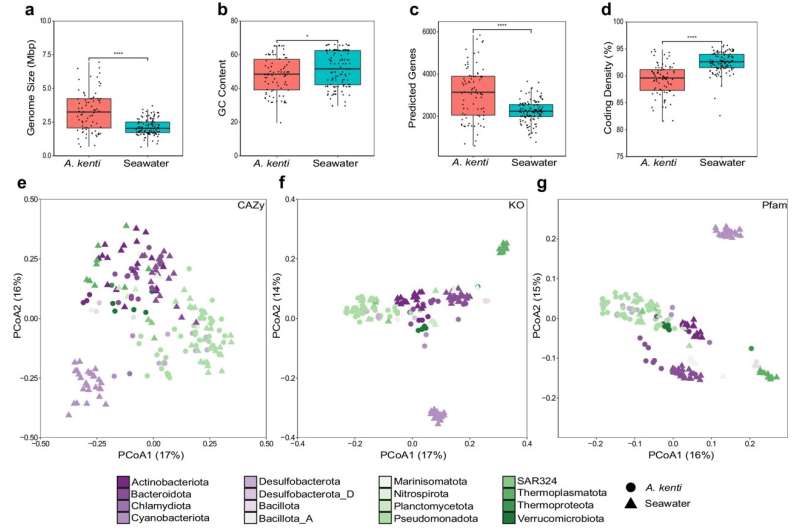This article has been reviewed according to Science X's editorial process and policies. Editors have highlighted the following attributes while ensuring the content's credibility:
fact-checked
peer-reviewed publication
trusted source
proofread
Microorganisms may be essential to the survival of coral reefs threatened by climate change

A study led by a researcher at the University of Stirling has identified microscopic organisms that may be crucial to the survival of coral reefs.
Dr. Lauren Messer analyzed Acropora kenti coral which is found in the Great Barrier Reef off the Australian coast. The study, titled "A genome-centric view of the role of the Acropora kenti microbiome in coral health and resilience," was published in Nature Communications.
Coral reefs support a quarter of all known marine species, and more than half a billion people depend on them for food, income, and coastal defenses however, climate change and pollution are threatening their survival.
Rising sea temperatures at the Great Barrier Reef has led to five mass coral bleaching events in the last eight years, a process which sees vital microscopic algae called zooxanthellae expelled by the coral.
Dr. Messer, a researcher in the Faculty of Natural Sciences, said, "Events like coral bleaching as a result of climate change means we are increasingly at risk of losing coral reefs and the essential ecosystem services that they support, in some cases before we even have a complete grasp of coral health and biology.
"Our study provides new information about the healthy functioning of A. kenti, shedding light on the intricate interactions between the coral animal and the microbiome, which underpins their ecological success.
"Our findings suggest that the ability of the microbiome to adapt to warmer and more nitrogen-rich waters may bolster A. kenti's resilience to stressful environmental conditions.
"The study ultimately contributes to a greater understanding of the ecology and evolution of A. kenti and provides insights into how its community of microorganisms may support its health in a changing world."
Dr. Messer's research provides new insights into the ecological roles of 82 specific microbial symbionts across 22 individual A. kenti colonies.
It was discovered that certain microorganisms can supply essential amino acids and B-vitamins to the coral host, much like the human microbiome. The research team also identified specific microbes that contribute to the cycling of carbon and nitrogen within A. kenti, which are vital nutrients required for all life.
Dr. Messer added, "Interestingly we also found that lots of different microbes encoded many of the same metabolic pathways, referred to as functional redundancy, which can ensure the microbial community continues to perform in a healthy way, even if some members of the community are lost.
"We were also able to identify how different microbes could find and establish a relationship with their coral host, and we observed several mechanisms by which the A. kenti microbiome may essentially hide from the coral's immune system to maintain their relationship.
"Our findings revealed that A. kenti-microbiome associations were shaped by changes in the surrounding seawater, including temperature and concentrations of dissolved inorganic nitrogen as two of the most important environmental factors.
"This information is important because corals are being forced to adapt to changes in their environment at accelerated rates, or face mass mortality, due to anthropogenic climate change and pollution."
More information: Lauren F. Messer et al, A genome-centric view of the role of the Acropora kenti microbiome in coral health and resilience, Nature Communications (2024). DOI: 10.1038/s41467-024-46905-5
Journal information: Nature Communications
Provided by University of Stirling



















